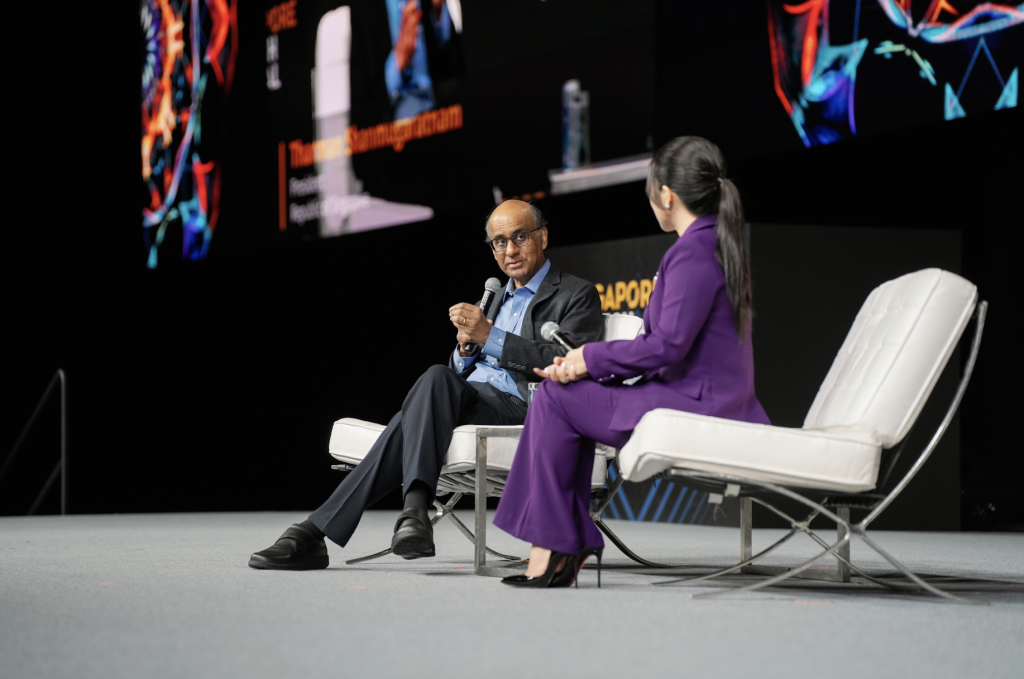There’s no denying that technology has drastically impacted the way we live. Concepts that were once science fiction are now becoming a reality with the emergence of technologies such as artificial intelligence (AI).
These technologies, which are reshaping economies and pushing the frontiers of the global digital economy, bring about tremendous potential, yet, they also come with precarious pitfalls — a discourse which has become top of mind for many governments and regulators as of late.
At the eight edition of the Singapore Fintech Festival today (November 15), President Tharman Shanmugaratnam weighed in on several key global issues relating to the integration of AI in today’s age of technology and innovation.
AI and LLMs are going to disrupt the workforce at a much faster rate
Since its launch back in November last year, ChatGPT has been a catalyst for widespread disruption across various industries. In fact, it took just five days for ChatGPT to reach a million global users following its launch.
President Tharman believes that Large Language Models (LLMs), like ChatGPT, are going to disrupt and take over jobs at a much faster rate than previous technologies — especially when it comes to those in the financial services sector.
Citing a study done in the United States, he highlights the fact that at least 10 per cent of the job functions within 80 per cent of existing roles can be easily replaced by machine learning and LLMs.
The earlier waves of technology and automation essentially replaced the what we call repetitive jobs, with routine and repetitive work. But what’s interesting with AI and LLMs is that it’s taking over cognitive tasks — tasks that are generally done by people who are better educated and in fact, these machines are even better than them.
– Tharman Shanmugaratnam, President of Singapore
That said, the integration of AI technologies into the workforce does not inherently mean that people are going to lose their jobs — instead, jobs are going to change fundamentally.
To this end, President Tharman shares that this new technological revolution might upend the traditional hierarchy of jobs. A higher paying job today will not necessarily translate to a higher paying job in the years to come.
This shift is driven by a reevaluation of the importance of IQ over EQ. Many jobs traditionally thought to require high IQ may be swiftly and more efficiently taken over by LLMs and AI.
Consequently, there arises a need to reassess and assign value to jobs that emphasise EQ, teamwork, and collective imagination — the jobs that require these qualities should be recognised and valued accordingly.
The good and bad of the integration of AI into the workforce

For mature economies like Singapore, where there is a lack of talent with skills like programming, the automation of cognitive jobs can prove to be advantageous to the city-state. It would reduce its reliance on outsourced talent and leverage technology to empower its workforce to “be more productive and enjoy their jobs a lot more”.
On the flip side, developing countries with surplus talent will be hit in areas like business process outsourcing (BPO) or the export of ICT services. However, President Tharman emphasises that societies with robust “public, private, and legal coordination” will be “well-placed to address these issues”.
As AI displaces a large band of white-collar workers who are tasked with “mid-level cognitive tasks” or even “upper mid-level cognitive tasks”, it’s important for organisations within a country or society to get together to provide these workers with alternatives to their current job scope, either by equipping them with a new job or by educating them on how to leverage emerging tech and provide added value.
“You can’t just leave it to individual firms and individual workers. It’s a collective task and we need to organise ourselves as a social organisation to address this,” says President Tharman.
Mitigating the safety risks of AI
Although the usage of AI and machine learning across various sectors can open up boundless possibilities, President Tharman underscores the equally significant potential of AI that can lead to “unintended catastrophic outcomes”.
While he acknowledges that it is “too early” to impose regulation, President Tharman emphasises that human intervention and global coordination is vital to mitigate the risks of these tools.
Take the healthcare sector, for instance. While AI will be a huge enabler when it comes to both diagnosis and the treatment of diseases, human judgement is still integral to ensure the ethical usage of these tools.
On a broader scale, when it comes to national and global security, the President advocates for a collective international effort in risk mitigation, asserting the necessity of a global coalition of countries. This collaborative effort is especially important when it comes to maintaining democracies, especially in an era where sophisticated fake information can be easily spread across consumer populations.
When you combine [deep fakes] with social media algorithms, you might think that you’re becoming more open-minded while being exposed to different ideas. But in reality, what happens is that you become more reinforced in your views and sometimes, your emotions. This systematically leads to polarisation.
The combination of AI deep fakes and the algorithms of the social media platforms is a very serious issue for the flourishing of democracy.
– Tharman Shanmugaratnam, President of Singapore
Despite these challenges, it’s important to embrace technological innovation like AI and wield it as a positive instrument of change to build a more sustainable and inclusive world — and the key to this lies in collaboration.
Featured Image Credit: Singapore Fintech Festival










